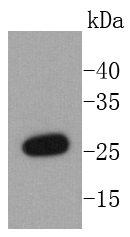Product Name :
NQO2 polyclonal antibody Background :
NAD(P)H:quinone oxidoreductase 1 (NQO1) and NRH:quinone oxidoreductase (NQO2) are flavoproteins that catalyze the metabolic detoxification of quinones and their derivatives to hydroquinones. This detoxification process protects cells against quinone-induced oxidative stress, cytotoxicity and mutagenicity. NQO2 is a 231 amino acid protein and is 43 amino acids shorter than NQO1 at its C-terminus. NQO2 is an isozyme of NQO1 and transfers two electrons to a quinone, resulting in the formation of a hydroquinone product . The NQO2 gene is ubiquitously expressed and induced in response to TCDD. NQO2 has a higher level of expression in mouse liver and testis than NQO1, which is highly expressed in the heart. NQO2 has a different cofactor requirement than NQO1 and uses dihydronicotinamide riboside (NRH) rather than NAD(P)H as an electron donor. Unlike NQO1, NQO2 is resistant to typical inhibitors of NQO1 such as dicoumarol, Cibacron blue and phenindonee, but is inhibited by quercetin and benzo(a)pyrene. NQO2 contains a specific metal binding site, which is absent in NQO1 and several cis-elements including SP1 binding sites, CCAAT box, XRE and ARE, which are located at the NQO2 gene promoter. Product :
Rabbit IgG, 1mg/ml in PBS with 0.02% sodium azide, 50% glycerol, pH7.2 Storage&Stability :
Store at +4°C after thawing. Aliquot store at -20°C or -80°C. Avoid repeated freeze / thaw cycles. Specificity :
NQO2 polyclonal antibody detects endogenous levels of NQO2 protein. Immunogen :
recombinant protein Conjugate :
Unconjugated Modification :
Unmodification
NQO2 polyclonal antibody Background :
NAD(P)H:quinone oxidoreductase 1 (NQO1) and NRH:quinone oxidoreductase (NQO2) are flavoproteins that catalyze the metabolic detoxification of quinones and their derivatives to hydroquinones. This detoxification process protects cells against quinone-induced oxidative stress, cytotoxicity and mutagenicity. NQO2 is a 231 amino acid protein and is 43 amino acids shorter than NQO1 at its C-terminus. NQO2 is an isozyme of NQO1 and transfers two electrons to a quinone, resulting in the formation of a hydroquinone product . The NQO2 gene is ubiquitously expressed and induced in response to TCDD. NQO2 has a higher level of expression in mouse liver and testis than NQO1, which is highly expressed in the heart. NQO2 has a different cofactor requirement than NQO1 and uses dihydronicotinamide riboside (NRH) rather than NAD(P)H as an electron donor. Unlike NQO1, NQO2 is resistant to typical inhibitors of NQO1 such as dicoumarol, Cibacron blue and phenindonee, but is inhibited by quercetin and benzo(a)pyrene. NQO2 contains a specific metal binding site, which is absent in NQO1 and several cis-elements including SP1 binding sites, CCAAT box, XRE and ARE, which are located at the NQO2 gene promoter. Product :
Rabbit IgG, 1mg/ml in PBS with 0.02% sodium azide, 50% glycerol, pH7.2 Storage&Stability :
Store at +4°C after thawing. Aliquot store at -20°C or -80°C. Avoid repeated freeze / thaw cycles. Specificity :
NQO2 polyclonal antibody detects endogenous levels of NQO2 protein. Immunogen :
recombinant protein Conjugate :
Unconjugated Modification :
Unmodification
-
 Western blot analysis of NQO2 on Hela cells lysates using anti-NQO2 antibody at 1/1,000 dilution.
Western blot analysis of NQO2 on Hela cells lysates using anti-NQO2 antibody at 1/1,000 dilution.
Bioworld Biotech only provide peptides for our antibodies and do not provide additional peptide customization services.
Price/Size :
USD 368/1mg/vial
Tips:
For phospho antibody, we provide phospho peptide(0.5mg) and non-phospho peptide(0.5mg).Describe :
Blocking peptides are peptides that bind specifically to the target antibody and block antibody binding. These peptide usually contains the epitope recognized by the antibody. Antibodies bound to the blocking peptide no longer bind to the epitope on the target protein. This mechanism is useful when non-specific binding is an issue, for example, in Western blotting (WB) and Immunohistochemistry (IHC). By comparing the staining from the blocked antibody versus the antibody alone, one can see which staining is specific; Specific binding will be absent from the western blot or IHC performed with the neutralized antibody.Formula:
Synthetic peptide was lyophilized with 100% acetonitrile and is supplied as a powder. Reconstitute with 0.1 ml DI water for a final concentration of 10 mg/ml.The purity is >90%,tested by HPLC and MS.
Storage:
The freeze-dried powder is more stable. For short time at 2-8°C. For long term storage store at -20°C.
Note :
This product is for research use only (RUO only). Not for use in diagnostic or therapeutic procedures.
 NQO2 polyclonal antibody
NQO2 polyclonal antibody  Datasheet
Datasheet COA
COA MSDS
MSDS SHIP
SHIP